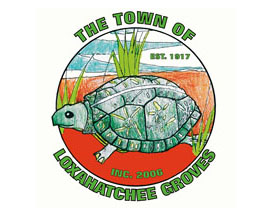The Loxahatchee Groves Town Council gave final approval Tuesday to a budget for fiscal year 2016 of just over $3 million, financed by a property tax rate of 1.4718 mills — above last year’s tax rate of 1.2 mills.
With the extra money, the town plans to give residents a break on their solid waste collection rate.
Increases in property values mean that the tax rate for the new fiscal year is well above the so-called “rollback rate” of 1.0759 mills. That is the figure at which town property taxes in 2016 would bring in the same amount as 2015.
The increase will be offset by a reduction of solid waste assessments for most residents through a transfer of funds from the town’s general revenue, with the strategy being to ease the overall amount paid to the town by homesteaded residents.
Councilman Jim Rockett reiterated his objections from the preliminary approval of the tax rate and budget, saying that he thought it was giving selective breaks to property owners at the expense of commercial properties and property owners who do not have a home on their land or get solid waste pickup service.
“I’m not in favor of the increase,” Rockett said. “I’d like to leave it at 1.2, which is an increase of under 10 percent due to property values. I don’t see a reason to raise taxes at all. I don’t see what it provides us that we don’t already have in the bank.”
Rockett said that the council could give back money as it did previously on the garbage assessment using funds that the town had accumulated.
“I just don’t get it, and I know I’m not going to convince anybody on this dais,” he said. “I know what your perspective is because I’ve heard it a couple of times. I just don’t see doing this.”
Rockett also reiterated his opinion that if the council wants commercial properties to pay more, it should create a special taxing district.
Vice Mayor Ron Jarriel said his priority has always been for the residents.
“I’ve got friends who live in Loxahatchee Groves; some of them use that property, some of them are farmers, some of them are nursery owners, but I’ve got them on all sides,” he said. “I’ve said it before, and I’ll say it again, to the commercial and to the developers of Loxahatchee Groves, I want you to pay taxes. I want the businesses you’re bringing into town, and I want it put back into paved roads and better drainage — anything that we can do to make life better for the residents.”
Jarriel said that he had also changed his opinion on debt, and that the current charter provision prohibiting the issuance of long-term bonds should be changed to enable financing more of the projects on the town’s capital improvements list.
Mayor Dave Browning said that he found it interesting that a recent survey conducted by the town showed that 70 percent of residents said they wanted roads paved, but 70 percent also did not want to pay for paving. He said that the town needs road improvements and that it shouldn’t rely solely on gas tax revenue for road repairs and paving.
“The amount of gas that’s sold might go down, and some of the other [revenue] that we get from municipal sharing, those are not always guaranteed,” he said. “This is still less than the 1.5 [millage rate] that we started out with as a town.”
He pointed out that the town is responsible for culverts under the roads, and the edges of some roads are wearing away, which are among the items on the council’s capital improvements list. “We’ve got to get those roads fixed or we’re going to lose them,” Browning said.
Councilman Ryan Liang agreed with Jarriel on debt issues.
“If we do want to do a lot of these projects sooner rather than later, we need to possibly consider working out something with debt, either with bonds or loans,” Liang said. “It’s all [about] how soon you want these projects to be done.”
During public comment, resident Doreen Baxter said she agreed with Rockett in his reasons for opposing the tax increase.
“And then we find out that we have $3 million-plus in the bank,” Baxter said. “I’m wondering why we haven’t spent any of that. Hopefully that will get done, and we’ll get a few things taken care of.”
She added that the town has had a tax rate of 1.2 mills since 2011. “It has always provided the town with more than enough revenue to operate,” Baxter said.
Former Councilman Dennis Lipp said that he was aware that the budget process is always difficult, but was concerned that the town’s increase would probably be the highest in the county.
“We don’t want to be there,” Lipp said. “That’s not us. We want to make things reasonable, and we want to pay for what we’re doing. We have a wish list, but what are we doing? We had a wish list when I was on the council. Things hardly ever got done.”
Lipp said he favored remaining at the 1.2 rate, at least for the next year.
Councilman Tom Goltzené said that he could go with no increase but also wanted to respond to residents who want better services.
“People come here week after week demanding things,” Goltzené said. “As administrators, [we are] the folks who have to decide how this is going to be done.”
Holding up a page with a list of capital improvements that the council would discuss later, amounting to an estimated $10.3 million, he pointed out that it would be more than 10 years before the town could get them done at the current rate that the town is collecting revenue.
Jarriel made a motion to approve the budget with a tax rate of 1.4718 mills, and it carried 3-2, with Rockett and Liang opposed.








